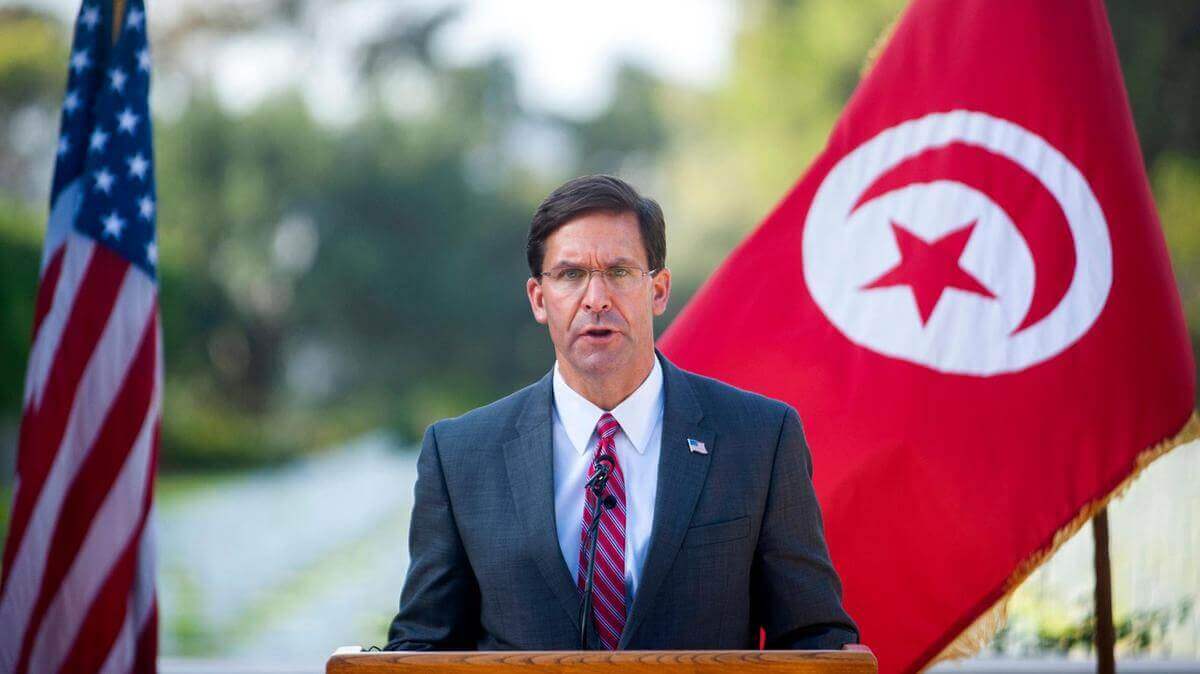Speaking at Carthage on Wednesday, following a meeting with Tunisian President Kaïs Saied, US Defense Secretary announced a 10-year military cooperation deal with Tunisia on Wednesday, providing an indication of growing coordination between Washington and Tunis.
The deal was signed with an eye on counterterrorism along Tunisia’s border with Libya, which has often been overrun by jihadist elements. During his speech, Esper said, “We look forward to expanding this relationship to help Tunisia protect its maritime ports and land borders, deter terrorism and keep the corrosive efforts of autocratic regimes out of your country.”
The location of Esper’s speech was noteworthy, as it was made at a cemetery that holds the remains of more than 2,800 American soldiers, the majority of whom died during World War II, serving as an image of the enduring relationship between the two countries. In fact, in 2015, the US designated Tunisia as a ‘Major non-NATO Ally’, having engaged in frequent military exercises over the years. Moreover, since 2011, the US Africa Command (Africom) estimates that Washington has invested over $1 billion in the Tunisian military. The US is Tunisia’s biggest weapons supplier, accounting for virtually 50% of Tunisia’s arms imports from 2015 to 2019.
As expected, Esper also used this opportunity to take aim at both Russia and China, saying that they were “intimidate[ing] and coerc[ing] their neighbors while expanding their authoritarian influence worldwide”. He added that this “malign, coercive, and predatory behavior” was “undermin[ing] African institutions”.
The latest deal between Washington and Tunis pertains to “training and after-sales service of sophisticated American weapons”. At present, the US already assists in the training of Tunisian forces and has worked with Germany to implement an electronic surveillance system along the country’s border with Libya.
Although Tunisia has in the past denied reports that it has allowed the US to operate weaponized drones from its territory against the Islamic State in Libya, the US defence press has since confirmed that it has used Tunisian bases in Bizerte to conduct such activities.
Greater US involvement in the region has been met with unease in the Tunisian population. In May, when Africom head General Stephen J. Townsend said that the US would be sending more troops to the country, there was widespread anger, forcing Africom to retract Townsend’s statement and say that it would only been sending a “small training unit” that would not partake in combat missions. Similarly, the Tunisian government was wary of public discontent and said that there were no designs to build a US military base in the country.
During his trip, Esper also met with his Tunisian counterpart Ibrahim Bartagi. Prior to his visit to Tunisia, he visited Malta on Tuesday. The Secretary visited Algeria today and will then jet off to Morocco, rounding off a trip with three of the US ‘Major non-NATO Allies’ in the Maghreb region.
US Signs 10-Year Military Cooperation Deal With Tunisia During Esper’s North Africa Tour
Defence Secretary Mark Esper is meeting with leaders from Malta, Tunisia, Algeria, and Morocco in an effort to bolster ties with ‘Major non-NATO Allies’ in the region.
October 2, 2020

IMAGE SOURCE: HASSENE DRIDI / APUS Defense Secretary Mark Esper
